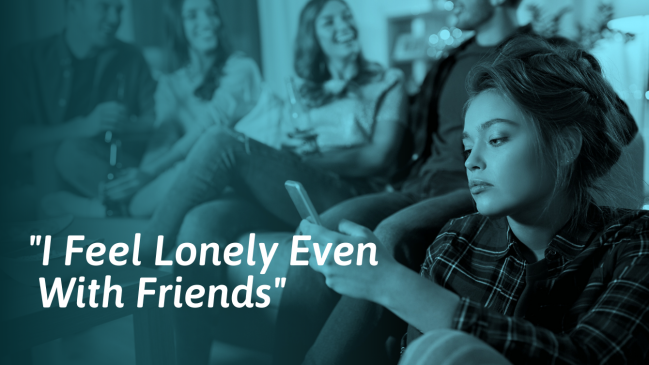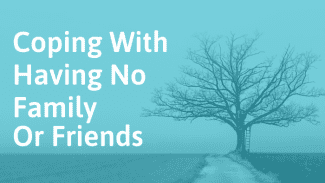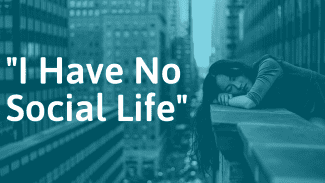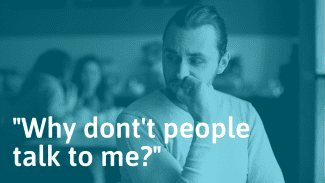“I feel lonely all the time, even when I’m surrounded by people. I feel like I have no friends, but I do. I know others care about me, but I still feel alone. What can I do?”
Most of us assume that if you have friends, you won’t be lonely, but this isn’t always true. If you often think, “Why do I feel lonely, even with friends around?” this guide is for you.
Reasons why you may feel isolated even when you’re in the company of others
- You have depression. Depression can cause feelings of loneliness, emptiness, and disconnection from others. You may feel like no one can possibly understand you or feel the same as you do. As a result, you may want to isolate yourself, which makes you feel lonely.
- You have social anxiety. Social anxiety can make you afraid of being judged, which in turn can make you reluctant to open up to others and form meaningful connections.
- You aren’t close to your friends. It doesn’t matter how many acquaintances you have. If you don’t have close friends or people you can truly talk to, you will still feel lonely.
- You’re not being vulnerable. If your conversations remain at a surface level, you will feel lonely because your needs for connections aren’t fully met. To connect to someone, you have to risk sharing parts of yourself. This can be especially hard if you have trust issues.
- Your friends or people around you don’t “get” you. You may feel lonely around friends and family if they tend to avoid or dismiss emotions. Statements like, “You shouldn’t be upset about that” can leave us feeling misunderstood and alone. The people around you may be uncomfortable with emotions, unempathetic, or self-centered.
- You had an emotionally neglectful childhood. Many people grew up in homes where everything seemed all right from the outside, but there was a lack of warmth and emotional connection. One study found that while physical and verbal abuse in childhood predicated anger later in life, emotional neglect predicted loneliness and isolation.[2] A lack of feeling loved in childhood can leave us feeling empty and alone as adults, even when others are around.
Here’s how to feel less alone:
1. Pay attention to what makes you feel lonely
Understand what triggered your feelings of loneliness. Was it that you made a joke and no one laughed? Maybe you opened up about your social anxiety and got a dismissive comment in response. Or perhaps you feel disconnected when you see two people share an inside joke.
If you understand what makes you feel lonely, you can learn to deal with those issues head-on. For example, if a specific person makes you feel lonely, you may want to take some distance from them. Or if everyone else seems more at ease than you and you wish you could be more laid back, practice learning how to be more relaxed in social situations.
2. Ask questions
We often feel lonely when we focus on our feelings and negative thoughts. It may help to bring your back to the people you’re talking to. This list of questions you can ask to get to know someone may inspire you.
Of course, advice may not apply if the relationship is one-sided. If you feel that you are asking questions more often than not, you’re bound to feel lonely. If that’s the case, we have a further article on what to do if you’re in a one-sided friendship.
3. Make like-minded friends
Sometimes we feel lonely with family or friends because they don’t get us, at least with particular things.
You may have some things in common with the people around you, but they don’t get your hobbies or your goals for the future. Perhaps you’re dealing with mental illness or personal problems that they just can’t understand.
Finding new like-minded people to connect with doesn’t mean you have to leave your old connections behind. It just means that regarding certain topics, you can learn to turn to other people.
4. Try to notice bids for connection
Sometimes we focus on what someone isn’t doing for us and miss the signs that they care.
Let’s say you have a friend, and you feel lonely because you feel that you are usually the one to text first. You may feel sad as you look at your phone, wondering whether you should send a message or not.
Focusing on the lack of messages can make you forget some of the ways your friend does try to show up for you, like posting an encouraging comment on your new profile picture or buying you your favorite cupcake when they pass by a bakery.
If you often think, “my friends make me feel lonely,” it may be that you are missing signals that suggest they want to spend more time with you or get to know you better. We have some tips on how to tell if someone wants to be your friend.
5. Use your online time wisely
We can spend time online having meaningful connections or spending hours mindlessly browsing social media and videos. The latter can leave us feeling lonelier than ever, as it may seem like everyone is out having a good time while we remain bystanders.
Have a social media cleanse where you unfollow people who leave you feeling envious or inferior. Instead, follow accounts that leave you feeling inspired. Dare to post comments and share your opinions on Reddit and Facebook groups. Share from your personal experience and use it to help others.
6. Connect to yourself
Often, when we feel lonely or disconnected from others, we are disconnected from ourselves. If you don’t know who you are, it can be difficult to be authentic around other people.
Some simple ways to connect to yourself are keeping small promises, spending time away from screens, and trying new things.
Small acts of connection with yourself can include things like going for a walk in nature or playing with paint. Spending time in nature can also help by reminding you that you’re part of something much bigger than yourself.
For more advice, see this guide: How To Be Yourself.
7. Do something kind for others
Acts of kindness can help you feel better about yourself, increase your happiness, and help you connect to others.
You don’t have to spend a lot of money to help others or make them feel appreciated.
Smile at a stranger, say thank you, or give a big tip to a friendly server. Write positive reviews for small businesses and services you enjoyed.
8. Join a class, club, or volunteer
Uniting with people over a shared interest or goal can help you feel close and connected. You may want to participate in beach clean-ups in your area or take part in a more structured project. Volunteering at an animal shelter can be a great way to connect with both people and animals. Look on meetup.com to find local groups.
You might also like this article on tips to make close friends.
9. Bring more physical touch into your life
A lack of physical touch can lead to loneliness, and physical contact can reduce the perception of loneliness.[1]
Of course, if you don’t have many people you’re close to, it may be challenging to get the physical touch you need.
You can try to bridge this touch-lack by massage therapy, cuddling with animals, stuffed animals, and even self-hugs.
Try placing a hand on your chest or stomach. Give yourself a self-massage or hug. Of course, it can’t be a complete replacement for touch from other people, but it can still send a message to your body that you are safe.
10. Do more activities with your friends
If you spend a lot of time “catching up” with your friends at parties or over dinner, try doing physical things together (like going kayaking, taking a cooking class, or playing sports) instead. This can help you feel more connected and allows you to build shared memories.
If you have long-distance friends, try to do something virtually. Having a phone call or video chat, send voice messages instead of just texting, playing video games together, or organizing a “movie date” can help you feel connected even when you are far apart.
11. Talk to a professional
If your feelings of loneliness are persistent, talking to a mental health professional can help you understand them better and develop an action plan if needed. A good therapist can hold space for you as you uncover the deeper reasons why you may feel the way you do. You can find an online therapist through a website like BetterHelp.





